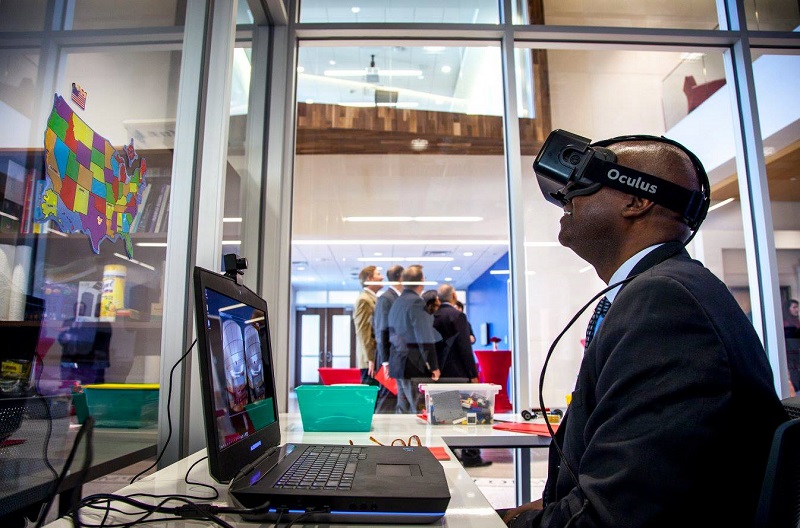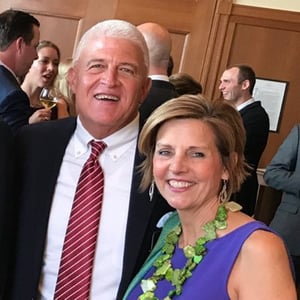
Tryna Knox came to her Education Ph.D. program at SMU after a long and successful career consulting for hospitals as a management engineer and business consultant. After changing careers to an elementary education teacher, she recognized systematic flaws in the schooling model. Resolved to make a difference, Tryna earned her Master of Educational Leadership before beginning her Ph.D. in Education.
Read on as Tryna shares her story about her journey to seeking her Ph.D., why she chose SMU, and how she feels evidence-based education research can transform the current model to better serve teachers and students.

 Tell me a little about yourself.
Tell me a little about yourself.
I grew up in the suburbs of Washington, D.C. I earned my associate in arts degree at Valencia Community College and then transferred to The University of Central Florida (UCF) to study Engineering. I worked full-time for Florida Hospital, Orlando while studying at UCF. My work evolved during my time in the hospital setting from a nurse staffing assistant to a full-time productivity engineer and cost accountant. I met my husband, got married, had two sons, and moved around several times. We settled in Dallas, Texas where my husband accepted an assistant Dean position in the Cox School of Business at SMU.
After 22 years consulting for hospitals, I was ready for a change. This led to an opportunity to explore my next career, in elementary education. After receiving my certification for EC-4th grades, I worked in elementary school as a science teacher for seven years before enrolling at SMU for a Master of Educational Leadership with principal certification to become a campus administrator.
My reason for pursuing an administrative position at that time, was my overarching desire to fix things that I observed were broken in the system and infrastructure of schooling. Generally, it seemed that the teacher had no voice when it came to ideas, input, or improvement recommendations. Not due to a lack of ideas, knowledge, or expertise (who could have more expertise about the children in a classroom for 6+ hours per day?) but simply due to the hierarchical infrastructure, or top down approach, present in most public-school systems.
Despite my best effort of offering ideas or suggestions or seeking out others with expertise I knew would benefit my students, I was left with an overwhelming sense that we systematically were broken and needed transformational change in order to meet the needs of every single student. This realization lead me to pursue my Ph.D. in Education.
Why do you think Education is an important and valuable field to study?
We need systematic changes in how we do schooling. The process of schooling is very complex. I’ve seen, first-hand, how the current model does or does not work for some students. We need transformational change in the processes and infrastructure of the institution of school.
I believe that in order to improve the system, to make things better, we must first study, and seek to understand the underlying problems. In order to understand, we need to conduct research. We must recognize and involve all critical stakeholders within and outside the schools in partnership towards radical problem-solving. The systematic collection and analysis of data is an imperative part of the process. And finally, we need to ensure improvements are implemented in a timely manner.
Why did you choose the Education Ph.D. program at SMU? What’s your favorite part about it?
I first chose this program because I was recruited. And since this was a college community that I have been a part of for over 20 years and I had previously earned a graduate-level degree from, I knew a lot about the caliber of environment present at SMU. I fully trust the professors that recruited me, and I recognized the opportunity to work and study with highly esteemed leadership, faculty, and staff. I am truly privileged to be a part of the SMU community!
SMU is in a great and convenient location with just the right size, it is a relatively small private college with an exemplary reputation and an exceptional teaching and research staff. The smaller size makes it feel more comfortable and intimate. It’s easy to get around the visually stunning campus nestled within the highly affluent neighborhood of Highland Park, Texas.
My favorite part of the program is the high-quality learning experiences that include hands-on opportunities connected to the research component. I am inspired by the esteemed teaching faculty that push me to higher levels and encourage outside thinking; helping to shape and mold me into a researcher.
Tell me about some of the research you’ve done over the course of your years of study.
Having just completed my first year of the program, I am still relatively new. However, I have had the opportunity to work on a large STEM project in partnership with a major technology company and a large metropolitan school district. The first role I held was coaching science teachers participating in the STEM program. I have recently transitioned into the research side of the same project.
This work, being brand new and aligned with recent coursework, is highly appealing. In this new role, I am working closely with the research team and have the opportunity to design research questions, interview protocols, manage the interview process, and analyze data, which is all very exciting. Having the opportunity to work in different aspect of the same research project is helpful and instrumental in gaining perspective on how the research process works. This allows for both a big picture perspective, as well as, a more granular view of the work.
What are your career dreams or plans? How has the Education Ph.D. program at SMU helped prepare you for your future?
This question obviously comes up frequently and my response is generally the same. I am first and foremost here for the journey and to absorb all that I can while I am here. To be given the opportunity to further my education and work in research is a dream come true! I have no specific plans after graduation, at this point in time — which is not to say that I have no ideas. I am confident that my previous professional career in engineering and business consulting, my experiences in education to date, connected with my love of teaching children and my passion for learning will come together and position me for what comes next. As I move forward on this educational journey that next step will be revealed.
Some potential future endeavors include:
- leading my own elementary school (focused on STEM education)
- teaching at the junior/community college level (I feel strongly about helping students get started on the right foundation in college studies)
- working as an educational consultant focused on helping schools/districts implement STEM programming or change management
- OR perhaps — all of the above!
Is there anything else you’d like to add? Any advice or wisdom you would pass along to a prospective student?
I would advise new students to first, think carefully and understand the reason you came to this path – write it and post it somewhere you will see regularly, so you never forget your why.
Graduate work, done well, is very hard work. It takes not only hard work but drive and determination. Don’t underestimate this fact. Every graduate student I’ve asked says there were times when they wanted to quit. It is at these critical moments that you will need some deeper level of commitment to keep you moving forward. You’ll need a reason to persevere. This is when that posted reminder of your reason for pursuing an advanced graduate degree is important. If you always remember your why it will give you the inspiration to continue when it’s hard, to work through the struggles, and to persist.
The good news is that SMU is a community of people that are like family! You will find SMU filled with amazing people that sincerely care about you both as a person and as a student. SMU has awesome diversity and, literally, something for everyone. In my experience, if you ask, SMU will help you fill every need you have. So, when the work is tough and you need a brain break, SMU has exactly what you need to get you through to the next day.
If you are interested in learning more about SMU's premier Education department or what makes our degree unique among all education Ph.D. programs, we invite you to reach out and request more information today.
